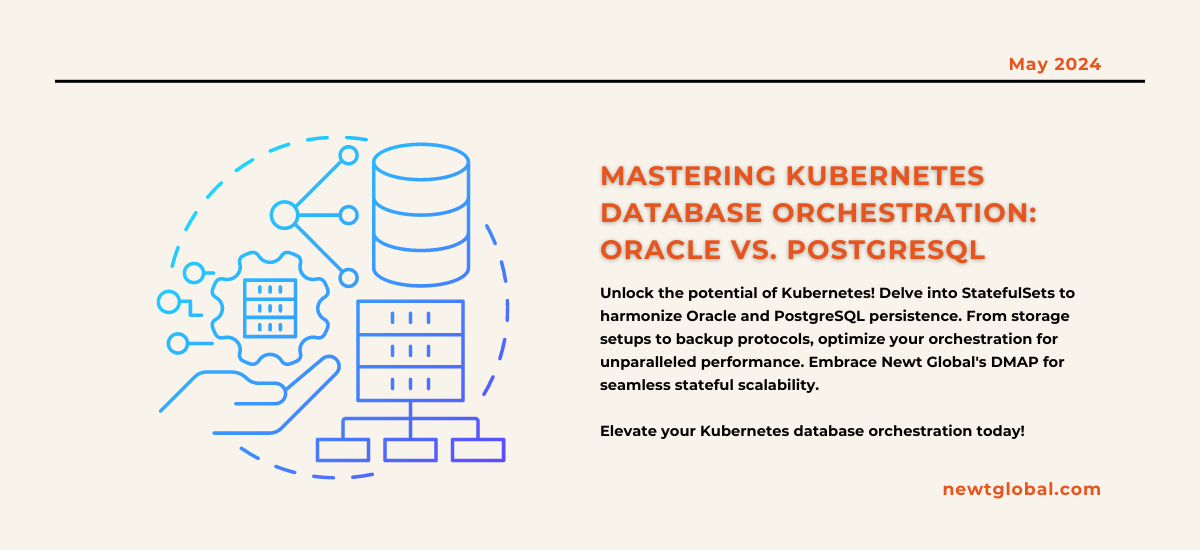
Handling Oracle and PostgreSQL databases in a system like Kubernetes can be tricky. Organizations face unique challenges when they use Kubernetes to manage these databases. Managing databases in this setup requires careful steps to make sure the data stays safe and the system runs smoothly. Kubernetes is a top tool for running applications in containers, which are like tiny, portable packages. It helps with setting up, growing, and keeping these applications running well. As more organizations use Kubernetes, it becomes really important to manage databases like Oracle and PostgreSQL correctly. This guide will help explain how to do that, focusing on using Kubernetes’ features to keep things running smoothly.
Understanding Kubernetes StatefulSets
Kubernetes StatefulSets are key for running databases. They give each part of the system (called a pod) a specific identity and network address. This is important because databases need to keep data safe and consistent, and StatefulSets help with this by making sure things stay in order and scale properly.
Deploying Oracle in Kubernetes StatefulSets
Setting up Oracle in Kubernetes StatefulSets needs careful planning to make sure it stays available and data is stored safely:
-
- Setting up Persistent Storage: This is important for keeping data safe even when parts of the system restart or change. Kubernetes offers different ways to set up storage, so organizations can choose what works best for their Oracle setup.
- Customizing Oracle: Adjusting Oracle settings to fit with Kubernetes rules is key for good performance. This might include things like setting up variables, managing resources, and adjusting network settings to work well with Kubernetes.
- Creating the Oracle StatefulSet: Making a detailed plan for how Oracle will run in Kubernetes helps it work smoothly. This includes things like choosing the right software versions, deciding how storage will be used, and setting up how services will run.
- Planning Backups and Recovery: Having a good plan for backing up data and recovering from problems is crucial. Kubernetes can help with scheduled backups and procedures for getting data back if something goes wrong.
Running PostgreSQL in Kubernetes StatefulSets
Running PostgreSQL in Kubernetes is similar, focusing on keeping data safe and making sure everything runs smoothly:
-
- Setting Up Persistent Storage: Like with Oracle, configuring storage in Kubernetes is the first step to keeping PostgreSQL data safe.
- Configure PostgreSQL Parameters: Adjust PostgreSQL to perform well in Kubernetes. This includes managing memory, connections, and cache settings.
- Deploy PostgreSQL StatefulSet: Create a detailed plan for PostgreSQL. Make sure everything from the container images to volume setups works well with Kubernetes.
- Enforce Backup and Recovery Protocols: Protect your PostgreSQL data with strong backup and recovery plans, using either Kubernetes tools or other solutions.
Best Practices for Managing Databases in Kubernetes
-
- Monitoring and Logging: Keep an eye on how your databases are doing and troubleshoot any issues quickly with good monitoring and logging tools.
- Resource Management: Use Kubernetes’ features to make sure databases have the right amount of CPU and memory.
- Security Measures: Protect your data with Kubernetes security tools, like access control and secret management.
- High Availability Strategies: Design your system to stay up and running smoothly, even through troubles, by using strategies like spreading out resources and automatic failovers.
Conclusion:
By carefully setting up and managing Oracle and PostgreSQL databases in Kubernetes, organizations can take advantage of Kubernetes’ strengths in scalability and reliability. Following best practices and making the most of what Kubernetes offers will help keep your databases running well in this environment.
Supercharge your Kubernetes database orchestration with Newt Global DMAP !
Ready to elevate your Oracle and PostgreSQL databases within Kubernetes to unparalleled heights? Harness the power of Newt Global DMAP to streamline your orchestration process and achieve optimal performance.
Contact us at marketing@newtglobalcorp.com to discover how Newt Global DMAP can revolutionize your Kubernetes StatefulSets deployment. Take action now and ensure seamless persistence and scalability for your databases.
Newt Global’s DMAP is a world-class product enabling mass migration of Oracle Db to cloud-native PostgreSQL – Faster, better, and cheaper.
Upgrade your Kubernetes database orchestration today with Newt Global DMAP and experience stateful harmony like never before.
